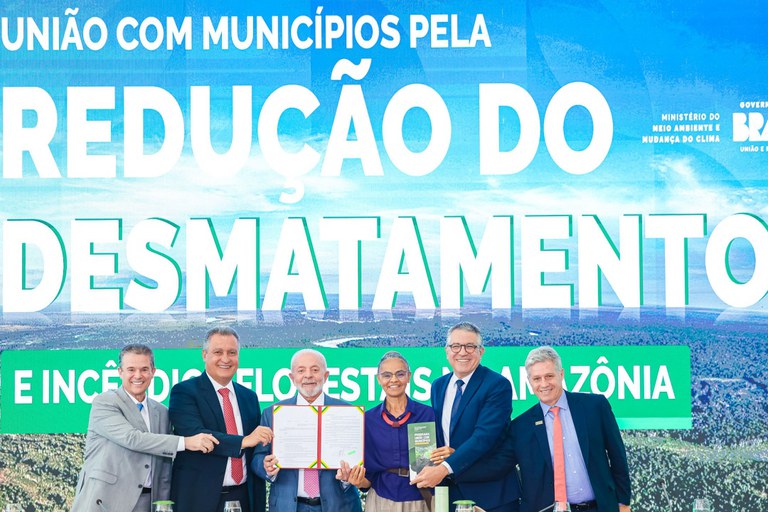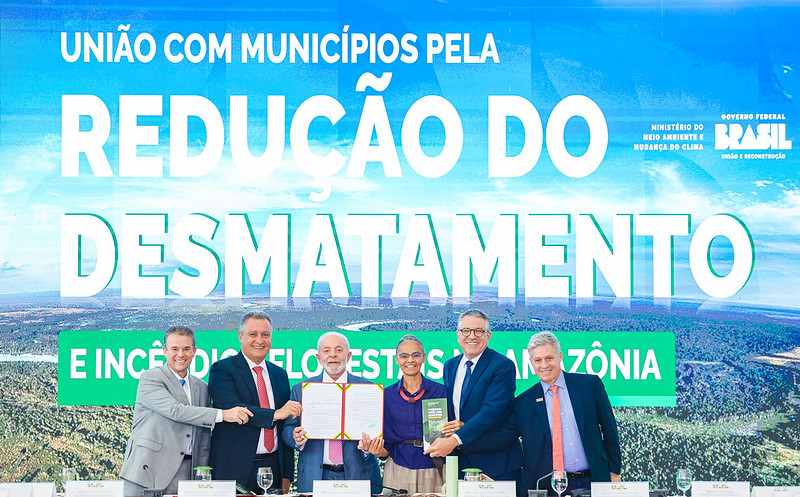Notícias
ENVIRONMENT
"Taking care of the Amazon means taking care of life," says Lula as he launches partnership with municipalities to combat deforestation

President Lula and ministers during the launch of the program to reduce deforestation in partnership with municipalities. Photo: Ricardo Stuckert / PR
"We're going to take care of the Amazon as if it were the most important thing on planet Earth, because taking care of the Amazon means taking care of life. Taking care of our indigenous people, fishermen, rubber tappers, the people who live there. And there's no point in us standing around trying to take care of it, because it's the mayor who knows whose land is burning. It's the mayor who knows which farmer is deforesting. The mayor knows, he's there".
We're going to take care of the Amazon as if it were the most important thing on planet Earth, because taking care of the Amazon means taking care of life. Taking care of the indigenous people, the fishermen, the rubber tappers, the people who live there. And there's no point in us standing around trying to take care of it, because the mayor knows whose land is burning. It's the mayor who knows which farmer is deforesting"
Luiz Inácio Lula da Silva, President of the Republic
With these words, President Lula summed up the importance of the Union with Municipalities for Reducing Deforestation and Forest Fires in the Amazon program, launched on Tuesday, April 9, at the Planalto Palace. The initiative provides for BRL 730 million in investments to promote sustainable development and combat deforestation and forest fires in 70 priority municipalities, responsible for 78% of deforestation in the Amazon in 2022.
» President Lula's full speech (available in Portuguese)
It's worth BRL 600 million from the Amazon Fund and BRL 130 million from Floresta+. The initiative is part of the Action Plan for the Prevention and Control of Deforestation in the Amazon (PPCDAm), which was relaunched in June 2023 after being suspended by the previous administration. From now on, the federal government and municipalities will work together on investments and actions to protect the Amazon.
"In Brazil, we have 40 million hectares of degraded land. We have a strong policy of recovering these 40 million hectares, where we can plant whatever we want. You can reforest. The important thing is that we preserve what we have. And we're the ones who have to do that: the federal government, the state government and the mayors," added President Lula.
DEADLINE - Fifty-three of the eligible municipalities have already joined the program. They are responsible for 59% of deforestation in the Amazon. The remaining 17 can sign the agreement by April 30. In addition to the mayor's signature, the agreement must be ratified by a councilor - preferably the mayor. Within 90 days, at least one state deputy and one federal deputy or senator from the state must declare their support for the municipality's adhesion in writing.
By joining the initiative, all municipalities will receive BRL 500,000 in equipment and services for structuring governance offices that improve environmental management, cooperation between municipal and federal governments and deforestation monitoring.
"Something that is too big, like developing, preserving, fighting inequality, creating a new cycle of prosperity, cannot be done alone. It's something you do with mayors, councilors, society and academia. Something that is too big is the result of everyone's action," said the Minister for the Environment and Climate Change, Marina Silva.
PARTNERSHIP - Marina listed a series of actions provided for in the program that must be followed if the fight against deforestation in the Amazon is to be successful. "We rely on technical assistance to increase production through productivity gains for producers. We have the use of the forest for exploitation based on sustainable management. We rely on processes of land regularization, environmental regularization, so that producers can have access to credit, because when they are fined, they can't have access to credit."
SUSTAINABILITY - The minister also said that the success of protecting the Amazon must be achieved through sustainable actions. "Our plan includes enforcement actions by IBAMA, ICMBio and the Federal Police, but there is one axis that is the apple of our eye, which is support for sustainable production activities. The Federal Government knows that it won't contain deforestation if it just uses command and control. We will curb deforestation when keeping the forest standing is more profitable, more advantageous, than cutting it down," he explained.
Also present at the event, Minister Alexandre Padilha (Institutional Relations) added to the argument. For him, the solution to the sustainability of the Amazon is to bet on people. "On communities, on their experiences, on their power. It's betting on people's leadership, which is the responsibility of every mayor. We see the mayors as the leaders of this project," he stressed.
This need to come together to find solutions to improve our environment is urgent and everyone's responsibility. Preserving the forest and providing conditions for those who live in it to produce sustainably is very important"
Claudomiro Gomes, mayor of Altamira (PA)
ALTAMIRA - Located in Pará, the municipality of Altamira is one of those that has already joined the program. With a vast area of 160,000 km², more than four times the size of Switzerland, Altamira has more than 140,000 km² of preserved native forest. Claudomiro Gomes, the city's mayor and president of the Association of Consortia of Municipalities of Belo Monte (ACBM), stressed the urgency of working together, an exercise he is already applying in actions and public policies aimed at the 13 municipalities that make up the Transamazon and Xingu regions, the area of influence of the Belo Monte Hydroelectric Power Plant project.
"This need to come together to find solutions to improve our environment, our planet, is urgent and everyone's responsibility. That's why we're here as signatories of this pact, because we understand that preserving the forest and providing conditions for those who live in it to produce sustainably is very important," he said. We owe the 140,000 km² of preserved native forest to the native peoples who live in this forest, to the traditional riverside communities who help preserve it, to the quilombolas and family farmers who together protect this forest," said the mayor.
COMMITMENT - Participating municipalities commit to actions to continuously reduce deforestation and forest degradation and must create a technical body to act as the program's focal point. Other criteria are the existence of a municipal secretariat responsible for environmental or sustainability policies and the holding of a meeting of the Municipal Environment Council within 90 days, with social participation.
PERFORMANCE – The federal government's resources will be earmarked for actions in the municipalities based on the logic of "payment for performance". In other words, the greater the annual reduction in deforestation and degradation, the greater the amount invested. The parameter will be Inpe's Prodes monitoring system. Prodes calculates the annual rate of deforestation, measured from August of one year to July of the following year. For 2024, the rate calculated between August 2022 and July 2023 will be taken into account.
GOALS - The goals set for the program until 2026 include the implementation of governance offices, in the first year of the program, in the 53 priority municipalities that have already declared their adherence, as well as environmental and land regularization actions in federal public lands that are not earmarked. The aim is also to create at least 30 municipal brigades to prevent and combat forest fires.

- Entenda os conceitos e números do programa de redução do desmatamento em parceria com municípios
30,000 FAMILIES - At least 30,000 families are expected to benefit from payments for environmental services and technical assistance actions. Payments for environmental services for settlements, through the Forest+ Project, will benefit 22,000 families by 2024.
NATIONAL FUND - During the event, President Lula issued a new decree reconfiguring the Advisory Council of the National Forestry Development Fund. The fund was created in 2006 with the aim of encouraging the development of sustainable forest-based activities in Brazil and promoting technological innovation in the sector. It is managed by the Brazilian Forest Service, a body linked to the Ministry of the Environment and Climate Change.
COMPOSITION - The mission of the new Council is to provide guidance on the allocation of the fund's resources and assess the effectiveness of its application. It will be made up of representatives from various institutions and sectors, including government bodies, states, municipalities, social movements, environmental organizations, traditional peoples and communities, the business sector, and workers in the construction, timber and family farming industries.


